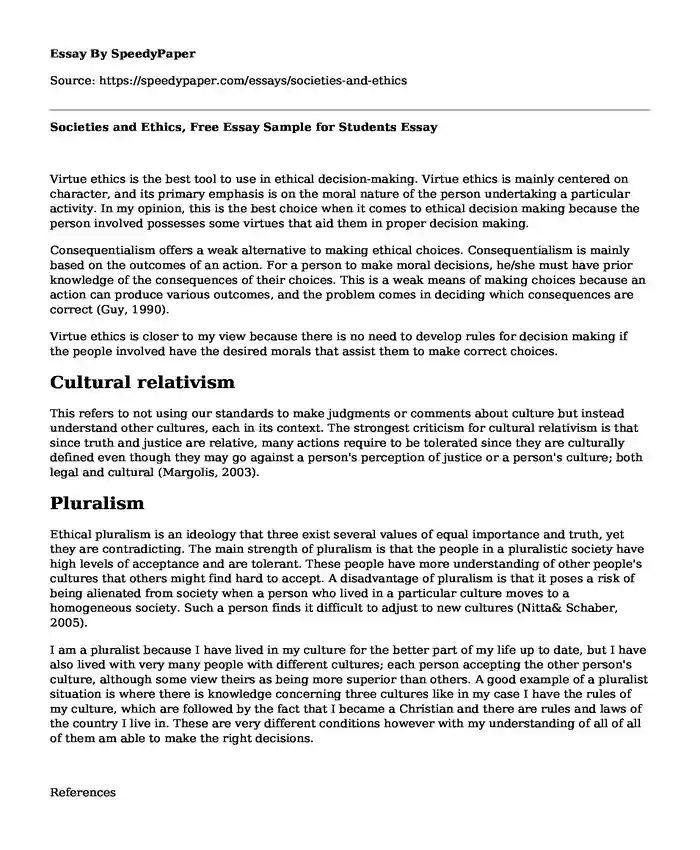Virtue ethics is the best tool to use in ethical decision-making. Virtue ethics is mainly centered on character, and its primary emphasis is on the moral nature of the person undertaking a particular activity. In my opinion, this is the best choice when it comes to ethical decision making because the person involved possesses some virtues that aid them in proper decision making.
Consequentialism offers a weak alternative to making ethical choices. Consequentialism is mainly based on the outcomes of an action. For a person to make moral decisions, he/she must have prior knowledge of the consequences of their choices. This is a weak means of making choices because an action can produce various outcomes, and the problem comes in deciding which consequences are correct (Guy, 1990).
Virtue ethics is closer to my view because there is no need to develop rules for decision making if the people involved have the desired morals that assist them to make correct choices.
Cultural relativism
This refers to not using our standards to make judgments or comments about culture but instead understand other cultures, each in its context. The strongest criticism for cultural relativism is that since truth and justice are relative, many actions require to be tolerated since they are culturally defined even though they may go against a person's perception of justice or a person's culture; both legal and cultural (Margolis, 2003).
Pluralism
Ethical pluralism is an ideology that three exist several values of equal importance and truth, yet they are contradicting. The main strength of pluralism is that the people in a pluralistic society have high levels of acceptance and are tolerant. These people have more understanding of other people's cultures that others might find hard to accept. A disadvantage of pluralism is that it poses a risk of being alienated from society when a person who lived in a particular culture moves to a homogeneous society. Such a person finds it difficult to adjust to new cultures (Nitta& Schaber, 2005).
I am a pluralist because I have lived in my culture for the better part of my life up to date, but I have also lived with very many people with different cultures; each person accepting the other person's culture, although some view theirs as being more superior than others. A good example of a pluralist situation is where there is knowledge concerning three cultures like in my case I have the rules of my culture, which are followed by the fact that I became a Christian and there are rules and laws of the country I live in. These are very different conditions however with my understanding of all of all of them am able to make the right decisions.
References
Guy, M. E. (1990). Ethical decision making in everyday work situations. New York: Quorum Books.
Margolis, J. (2003). Selves and other texts: The case for cultural realism. University Park, Pa: Pennsylvania State University Press
Nitta, T., & Schaber, P. (2005). Ethical pluralism. Hokkaido University Press.
Cite this page
Societies and Ethics, Free Essay Sample for Students. (2022, Sep 19). Retrieved from https://speedypaper.net/essays/societies-and-ethics
Request Removal
If you are the original author of this essay and no longer wish to have it published on the SpeedyPaper website, please click below to request its removal:
- Tuck Everlasting - Literary Essay Sample
- Free Essay Sample: A World of Diversity
- Essay Example for Students: Racism in America
- Free Essay Discussing Problems with Criminal Justice: Negative Effects of Incarceration
- Paper Example - Permanent Injuries in the NFL: Thoughts on the Video
- Free Essay. Keiser University Annotated Bibliography
- Death of George Floyd, Breonna Taylor, and Others - Essay Example
Popular categories





